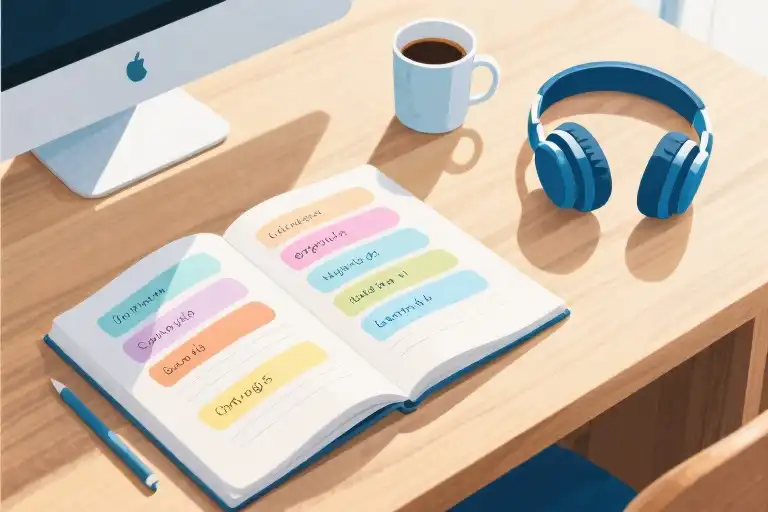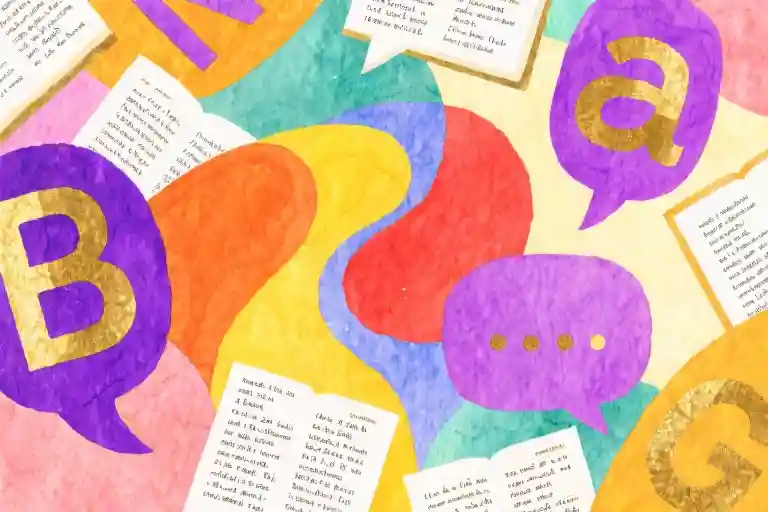The moment I handed in my C2 German exam papers, I performed my little ritual of liberation – tearing up vocabulary lists with a satisfaction usually reserved for shredding old tax documents. The confetti of conjugated verbs and declension tables floated into the trash bin like linguistic snowflakes. Freedom tasted like stationery glue and recycled paper.
For exactly three days, I floated through life untethered from flashcards and grammar drills. My mornings no longer began with the accusative case; my evenings weren’t punctuated by recording monologues about environmental policies. The silence was… unnerving. Without the familiar weight of learning objectives, time stretched before me like an untouched notebook – pristine and slightly intimidating.
Language learners will recognize this peculiar emptiness. It’s the flip side of our achievement high, when the brain’s reward circuitry suddenly stops firing those little ‘well done’ dopamine bursts we’ve grown addicted to. The withdrawal manifests in small ways: fingers twitching for absent flashcards during coffee breaks, ears automatically dissecting strangers’ conversations for subjunctive markers, that phantom itch to correct someone’s adjective endings.
As a language teacher living this bilingual reality professionally, the quiet feels especially jarring. My workdays are normally a linguistic obstacle course – explaining Italian irregular verbs in English to German students before lunch, then troubleshooting false cognates between Romance languages in the afternoon. The constant code-switching creates its own rhythm, like mental calisthenics. When that familiar cadence stops, the silence doesn’t bring peace – it echoes.
Perhaps this explains why language acquisition becomes more than a skill for people like us. It’s a cognitive habitat, a way of structuring thought itself. The textbooks and exams are just formalities; the real addiction lives in the neural pathways we’ve rewired through thousands of hours of practice. We don’t just learn languages – we become people who need to learn.
So when the siren song started again (this time in French, with its liquid consonants and coquettish liaisons), resistance proved predictably futile. The trigger came unexpectedly – a snippet of Françoise Hardy drifting from a café speaker, those nasal vowels wrapping around me like Gauloises smoke. My spine recognized the syntax before my conscious mind did. The craving returned with embarrassing immediacy.
There’s something particularly treacherous about French for an Italian speaker. Our languages share enough DNA to create constant deja vu, yet diverge just enough to spawn delightful betrayals. Every faux ami feels like a culinary prank – why does ‘librairie’ sell books when it sounds like it should sell scales? Why must ‘pain’ be bread rather than the obvious alternative? The frustration is part of the seduction, like bickering with an old lover.
What makes this new obsession different is its purity. Teaching German and English has professionalized those languages, turned them into work tools. But French? This one’s just for me – no lesson plans, no error correction, just the selfish pleasure of rolling ‘entrechat’ and ‘chuchoter’ around my mouth like wine tasting notes. The contrast makes me wonder: do polyglots need one ‘wild’ language, untouched by practicality, to keep the passion alive?
The torn-up German notes are barely cold, and already I’m compiling French resource lists with the zeal of a relapsing addict. My browser history has gone from ‘C2 exam results’ to ‘best Parisian patisserie tours’ in record time. This isn’t just about verbs and vocabulary anymore – it’s about reclaiming that delicious beginner’s mindset where every idiom discovered feels like finding a stray macaron in your coat pocket.
Maybe true fluency isn’t reaching some finish line, but learning to love the stumble. The exams end, the textbooks close, but the hunger remains – shifting shapes, finding new voices. Today it whispers in French; tomorrow perhaps Japanese or Farsi will croon their siren songs. The specifics hardly matter. What lingers is the understanding that for people like us, language learning isn’t something we do. It’s how we live.
The Withdrawal Diary
The alarm didn’t go off at 6:00 AM, yet my eyes snapped open with military precision. My hand reached automatically toward the nightstand, fingers groping empty air where the German vocabulary flashcards should have been. For three hundred and seven consecutive mornings, this ritual had anchored my existence – caffeine in the left hand, laminated verb conjugations in the right. Now both hands hung useless at my sides, like a pianist’s after the final concerto note fades.
Public transportation became surreal that first week post-exam. My ears, trained to dissect German compound nouns from ambient noise, now involuntarily parsed commuter conversations for grammatical structures. A teenager’s slang mutated into a case study of prepositional misuse; lovers’ quarrels transformed into imperfect tense demonstrations. The analytical machinery kept whirring without raw material to process, leaving me mentally exhausted by unrequested linguistic autopsies.
This phantom limb syndrome extended to my browsing history. Muscle memory carried me repeatedly to online dictionaries before I remembered there were no new words to look up. My fingers itched to create Anki cards for nonexistent vocabulary lists. Even dreams betrayed me – in one particularly cruel nocturnal episode, I found myself trapped in an endless Berlin U-Bahn station where all signage displayed only the dative case.
What surprised me most wasn’t the persistence of these habits, but their emotional texture. The relief I’d anticipated carried an undercurrent of something suspiciously like grief. Each unrecognized idiom in the wild felt like meeting an old friend who no longer remembers your name. My carefully cultivated language routines hadn’t just structured my time – they’d rewired my perception, leaving the world feeling oddly dimensionless without their filter.
The withdrawal symptoms revealed an uncomfortable truth: fluency isn’t a destination where you unpack your bags, but a temporary camp you strike on an endless hike. The C2 certificate now gathering dust on my shelf proved I could navigate German’s treacherous grammatical terrain – but the real discovery was how deeply I’d come to need the journey itself.
Perhaps this explains why, during that disorienting week, I found myself lingering outside the Alliance Française on my way home. The posters in the window promised ‘La douceur de vivre’ through evening classes. My rational mind protested – hadn’t I earned rest? But some deeper instinct recognized the telltale signs: the quickened pulse when hearing accordion music from a café, the way my tongue absently shaped itself around phantom ‘r’ sounds. The sirens were tuning up for their next performance.
The Confessions of a Language Addict
There’s a peculiar emptiness that follows the completion of a major language goal. After passing my C2 German exam, I found myself staring at my bookshelf, fingers twitching with muscle memory for flashcards that no longer needed reviewing. The withdrawal symptoms were real – I’d catch myself analyzing grocery store announcements for subjunctive mood, or mentally correcting a waiter’s adjective endings while ordering coffee. This wasn’t just habit; it was the brain’s addiction to linguistic patterns refusing to power down.
The comparison to quitting smoking isn’t accidental. Like nicotine cravings, the urge to dissect language structures would hit at unpredictable moments. A student’s innocent question about Italian irregular verbs would trigger full-body tension until I’d researched the etymological reasons. Morning commutes felt incomplete without conjugating verbs in my head. The irony wasn’t lost on me – as someone who teaches language learning strategies, I’d become a case study of my own advice gone rogue.
Teaching multiple languages professionally only fuels this addiction. Each classroom interaction becomes a potential fix: explaining English phrasal verbs releases one neurotransmitter cocktail, decoding German compound nouns administers another. The student who asks “Why does French have so many silent letters?” might as well be offering me a linguistic cigarette after months of sobriety. I’ve come to recognize the warning signs – when preparing lesson plans transforms into compiling comparative vocabulary lists for personal enjoyment, the relapse is already complete.
What makes this addiction particularly stubborn is its self-reinforcing nature. Every new linguistic connection creates neural pathways begging to be used. Discover that German ‘Fernweh’ (distance-pain) has no English equivalent? Now you’re hooked on untranslatable words. Notice how Italian hand gestures form a parallel grammar? Suddenly you’re auditing body language seminars. The brain becomes a compulsive collector, always seeking the next lexical rarity to add to its trove.
Yet there’s an unexpected benefit to this condition. Unlike substance addictions that dull the senses, language addiction heightens them. Walking through my hometown becomes a treasure hunt for loanwords and false friends. Casual conversations turn into fieldwork opportunities. Even silence becomes rich with potential meanings. Perhaps this isn’t an addiction to escape reality, but one that makes reality more vivid – one fix at a time.
The Siren’s New Song: From German to French
There’s a particular kind of madness that comes with being a language addict. Just three weeks after burning my German flashcards in a ceremonial bonfire, I found myself standing frozen in a Bologna grocery aisle, spine tingling as Charles Aznavour’s La Bohème played over the speakers. The accordion notes didn’t just enter my ears—they marched down my vertebrae like a line of musical ants, each one carrying tiny parcels of French vocabulary I didn’t yet possess.
This wasn’t supposed to happen. My language-learning hiatus was meant to last at least six months. But French has always been different—the linguistic equivalent of that one ex who texts you at 2 AM with a single winking emoji. As an Italian, I’m contractually obligated to maintain a love-hate relationship with our cultural cousins across the Alps. Their bread terminology is absurdly complex (why must there be twelve words for baguette?), their nasal vowels sound like someone chewing with their mouth open, and yet…
And yet.
There’s something about French that bypasses all rational resistance. Maybe it’s how the language moves—not in the straightforward Italian way where words barrel toward their meaning like Vespa riders, but in those elegant detours where even a simple “oui” gets decorated with half-swallowed consonants and eyebrow lifts. Or perhaps it’s the cultural baggage we Italians share with the French, that peculiar sibling rivalry where you mock their pretentiousness while secretly envying their effortless chic.
My students often ask why I don’t teach French given this fascination. The truth is complicated. Some passions need to stay personal, untouched by lesson plans and grading rubrics. When your livelihood revolves around dissecting language mechanics, there’s sacred space in having one tongue that exists purely for pleasure—for stumbling through Proust with a dictionary, for butchering restaurant orders in Montmartre, for the private thrill of catching whispered metro conversations like linguistic fireflies.
Last Tuesday, the relapse became official. I caught myself analyzing the phonetic patterns in a Françoise Hardy song instead of preparing next day’s German lesson. The telltale signs were all there: the open Duolingo tab masquerading as “research,” the sudden urge to pronounce every Italian word with a French accent, the Google search history filling with “best patisseries in Lyon” instead of teaching materials. The sirens had switched dialects, and resistance, as always, proved futile.
What surprises me most isn’t the attraction itself, but its intensity. After years of teaching languages, you’d think the magic would fade. Yet here I am—a supposed professional—getting goosebumps over the way French turns even mundane phrases into miniature poems. “Je t’aime” isn’t just “I love you”; it’s a three-syllable sonnet where the final “me” lingers like wine aftertaste. “Crème brûlée” crackles in your mouth before the spoon even touches lips. This isn’t fluency hunger; it’s linguistic gluttony.
Perhaps that’s the dirty secret of language addiction: the high never lasts. C2 German brought temporary satisfaction, but true addicts always need a stronger fix. Today it’s subjunctive conjugations, tomorrow it’ll be arguing about Camus in a Parisian café without embarrassing myself. The goalposts keep moving because the joy was never really about reaching them—it’s about hearing the sirens’ call and willingly diving into the waves again.
Even if these particular waves smell suspiciously like garlic butter.
The Double Life of a Language Addict
There’s a peculiar exhaustion that comes from living between languages. Not the kind you feel after conjugating German verbs for three hours straight, but the slow drip of cognitive dissonance when your teaching languages start bleeding into your passion projects. I noticed it first in the way my hands would hover over the keyboard during Italian grammar lessons, fingers twitching to type French phrases that had nothing to do with the subjunctive mood we were discussing.
Teaching English to German speakers while secretly compiling French vocabulary lists creates this strange linguistic jet lag. Your professional languages become well-worn paths – efficient, predictable, somewhat tired. The new language? That’s the overgrown forest trail you can’t resist exploring, even when you should be grading papers. The mental energy required to maintain this duality surprised me. Preparing German lessons requires one kind of focus; absorbing French phonetics demands completely different muscles. It’s like being a tennis coach who spends evenings training as a ballet dancer – similar disciplines, opposing techniques.
Then came the slip-ups. Small at first – greeting my English students with “bonjour” instead of “good morning.” Then more noticeable: explaining Italian pronouns while accidentally using French examples. The students found it amusing (“Teacher’s got Francophilia!”), but it revealed the uncomfortable truth about language addiction – your brain has limited bandwidth, and passion projects tend to hijack the system.
What fascinates me most is how differently I approach my teaching languages versus my “for fun” French. With German and English, I analyze sentence structures like a mechanic inspecting engine parts. With French, I let the words wash over me, savoring the nasal vowels like wine tasting notes. The former is work; the latter is play. Yet both feed the same insatiable appetite – that rush when unfamiliar syntax suddenly makes sense, when you dream in a new language for the first time.
Perhaps this duality isn’t a conflict but a necessary balance. The structured teaching keeps my linguistic foundations strong, while the spontaneous French studies remind me why I fell for languages in the first place. Though I should probably stop testing this theory during actual lessons – my students deserve coherent instruction, not their teacher’s latest linguistic infatuation.
The Siren’s New Song
The morning after my German C2 exam results arrived, I found myself standing in the kitchen, mechanically stirring coffee with one hand while the other twitched toward where my vocabulary flashcards usually sat. The absence of that familiar morning ritual left a peculiar hollow space in my routine – like forgetting to put on a watch and constantly glancing at your bare wrist anyway.
This is the paradox of language fluency: we chase it obsessively, measuring progress in memorized verb conjugations and conquered grammar rules, only to discover that reaching the destination feels suspiciously like losing something vital. The textbooks get shelved, the flashcards retire, and suddenly you’re left with what psychologists might call ‘goal withdrawal’ – though I prefer to think of it as my brain’s way of asking, ‘What’s next?’
As someone who teaches languages for a living, I should have seen this coming. My students often ask me when they’ll ‘finish’ learning a language, and I always give them the unsatisfying truth: never. Not really. There’s always another dialect to explore, another layer of cultural nuance to uncover. Language learning isn’t a highway with an exit ramp marked ‘Fluency’ – it’s more like coastal waters where new currents keep pulling you toward unexpected shores.
Which explains why, three weeks into my post-exam freedom, I caught myself dissecting the lyrics of a French pop song in a café. The way the singer rolled her ‘r’s like marbles in a wooden box, the playful cadence that made even a grocery list sound romantic – it all felt dangerously enticing. My fingers itched for a fresh notebook. My ears strained to catch phrases from tourists at the next table. The sirens were singing again, and this time their melody came with a distinct Parisian accent.
What makes this particular language addiction so compelling is how French taunts me with its near-familiarity. As an Italian, I should theoretically have an advantage with vocabulary, yet every faux ami (false friend) feels like a personal betrayal. The grammar rules that mirror ours just closely enough to be misleading. The cultural references we’ve absorbed through shared history, yet interpret through different lenses. It’s like trying to have a conversation with a slightly distorted mirror – comforting and disorienting in equal measure.
Teaching multiple languages has taught me that every new linguistic pursuit changes how you think in unexpected ways. German gave me structural precision, English offered fluid adaptability, and now French whispers promises of melodic expression. Each becomes a different colored lens through which to view the world, and the addiction isn’t really to the languages themselves, but to those sudden moments when a new perspective clicks into place.
So here I am again, ankle-deep in a new ocean of irregular verbs and gendered nouns, chasing that familiar thrill of not-quite-understanding. The textbooks have crept back onto my desk, the flashcards repopulated my phone, and my morning coffee once again comes with a side of vocabulary drills. Some might call it a relapse. I prefer to think of it as answering an invitation – one written in elegant, exasperating French cursive.
Perhaps we’re all just linguistic sailors, lured by different siren songs at different seasons. The waters change color, the melodies shift key, but the essential pull remains the same. So tell me, fellow language addicts – where are your personal sirens calling you these days? 🌊





